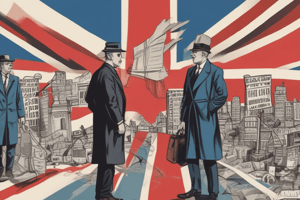Podcast
Questions and Answers
What key aspect of Thatcher's leadership is indicated by her nickname 'milk snatcher'?
What key aspect of Thatcher's leadership is indicated by her nickname 'milk snatcher'?
- Her promotion of free school meals
- Her controversial policies regarding welfare (correct)
- Her efforts to increase milk distribution
- Her emphasis on educational funding
What does the term 'post-Thatcher consensus' refer to?
What does the term 'post-Thatcher consensus' refer to?
- Agreement among parties on economic principles (correct)
- Disagreement on welfare policies
- Major parties opposing Thatcher's policies
- A shift towards leftist ideologies
Which of the following factors is noted to influence a historian's interpretation of events?
Which of the following factors is noted to influence a historian's interpretation of events?
- The political, religious, moral, or cultural viewpoint of the author (correct)
- The time period in which the event occurred
- Historical facts documented by previous historians
- The popularity of the event among the public
Margaret Thatcher's early career included which of the following roles before entering politics?
Margaret Thatcher's early career included which of the following roles before entering politics?
Which characteristic of Thatcher is reflected in her upbringing?
Which characteristic of Thatcher is reflected in her upbringing?
What was a significant aspect of Britain's foreign relations during Thatcher's time?
What was a significant aspect of Britain's foreign relations during Thatcher's time?
How did public perception of Thatcher evolve over time?
How did public perception of Thatcher evolve over time?
What role did Margaret Thatcher's family background play in her political career?
What role did Margaret Thatcher's family background play in her political career?
What was a significant negative consequence of Thatcher's policies on regional support for the Conservative Party?
What was a significant negative consequence of Thatcher's policies on regional support for the Conservative Party?
How did Thatcher's approach to political advisers differ from previous practices?
How did Thatcher's approach to political advisers differ from previous practices?
What impact did Thatcherism have on the educational background of Members of Parliament (MPs) by 2010?
What impact did Thatcherism have on the educational background of Members of Parliament (MPs) by 2010?
What effect did devolution have during Thatcher's time?
What effect did devolution have during Thatcher's time?
What was one consequence related to voter turnout during Thatcher's government?
What was one consequence related to voter turnout during Thatcher's government?
By what percentage did the number of MPs with a legal background decline from 1974 to 1997?
By what percentage did the number of MPs with a legal background decline from 1974 to 1997?
What was a notable change in the political composition of MPs between 1945 and 2010?
What was a notable change in the political composition of MPs between 1945 and 2010?
How did Thatcher's economic policies inadvertently affect the political landscape?
How did Thatcher's economic policies inadvertently affect the political landscape?
What was one significant claim regarding social divisions in Britain by the end of the 1980s?
What was one significant claim regarding social divisions in Britain by the end of the 1980s?
How did Thatcherism affect the Labour Party during the 1980s and 1990s?
How did Thatcherism affect the Labour Party during the 1980s and 1990s?
What is one argument made by historians regarding Thatcher's economic policies?
What is one argument made by historians regarding Thatcher's economic policies?
What was a consequence of Thatcher's policies on the Conservative Party?
What was a consequence of Thatcher's policies on the Conservative Party?
Which aspect of British society was notably affected during the 1980s due to Thatcher's policies?
Which aspect of British society was notably affected during the 1980s due to Thatcher's policies?
What was a potential shift in British politics after Thatcher's time?
What was a potential shift in British politics after Thatcher's time?
Which of the following was a response of historians to Thatcher's influence on economic policies?
Which of the following was a response of historians to Thatcher's influence on economic policies?
What role did Anthony Crosland's work play in relation to Labour's ideological transformation?
What role did Anthony Crosland's work play in relation to Labour's ideological transformation?
Flashcards
Historian Bias
Historian Bias
Historians' personal opinions and beliefs can influence their research and interpretations of events.
Evaluating Interpretations
Evaluating Interpretations
Scrutinizing multiple viewpoints of historical events to gain a more comprehensive understanding.
Author's Agenda
Author's Agenda
A specific goal or viewpoint the author of a historical account is attempting to project or promote.
Political Consensus
Political Consensus
Signup and view all the flashcards
Market Economy
Market Economy
Signup and view all the flashcards
Low Direct Taxation
Low Direct Taxation
Signup and view all the flashcards
Smaller Role of State
Smaller Role of State
Signup and view all the flashcards
Margaret Thatcher's Career
Margaret Thatcher's Career
Signup and view all the flashcards
Thatcher's impact on regional politics
Thatcher's impact on regional politics
Signup and view all the flashcards
Decline in Conservative support in Scotland
Decline in Conservative support in Scotland
Signup and view all the flashcards
Rise of Scottish/Welsh nationalism
Rise of Scottish/Welsh nationalism
Signup and view all the flashcards
Devolution's connection to Thatcher
Devolution's connection to Thatcher
Signup and view all the flashcards
Use of outside advisors
Use of outside advisors
Signup and view all the flashcards
Decline in voter turnout
Decline in voter turnout
Signup and view all the flashcards
MP background changes
MP background changes
Signup and view all the flashcards
Rise in political advisors
Rise in political advisors
Signup and view all the flashcards
Thatcherism's Economic Impact
Thatcherism's Economic Impact
Signup and view all the flashcards
Social Divisions Under Thatcher
Social Divisions Under Thatcher
Signup and view all the flashcards
Was Thatcher's Policies the Cause?
Was Thatcher's Policies the Cause?
Signup and view all the flashcards
Thatcherism's Impact on Conservatism
Thatcherism's Impact on Conservatism
Signup and view all the flashcards
Thatcherism's Impact on Labour
Thatcherism's Impact on Labour
Signup and view all the flashcards
From Polarization to Consensus
From Polarization to Consensus
Signup and view all the flashcards
Labour's Shift to Centre Ground
Labour's Shift to Centre Ground
Signup and view all the flashcards
Evaluating Historical Interpretations
Evaluating Historical Interpretations
Signup and view all the flashcards
Study Notes
Britain Transformed (1918-1997) - Thatcher's Impact (1979-97)
- Thatcher's economic policies were radical, shifting Britain towards a free market from state intervention
- Historians debate the effectiveness of these policies in changing Britain's long-term economic performance
- Some argue her policies weakened British industry and created wealth inequality
- The extent to which state intervention decreased is also debated
- Some historians argue Thatcher failed to prevent state growth, citing increased welfare and law-and-order costs
- Others argue that market forces and individual freedom were emphasized more than state intervention
- Social divisions in Britain deepened in the 1980s, evident in riots, industrial conflict, and social controversies
- The degree to which Thatcher's policies caused these divisions is debated
- Some historians link social division to longer-term societal and economic changes
- Thatcher's policies have been credited with transforming the Conservative and Labour parties, affecting party ideologies and electoral success.
- The period witnessed significant ideological and political shifts in Britain, including shifting political positions of the Labour Party
Evaluating Historical Interpretations
- Historians use available evidence to interpret past events and their viewpoints are invariably influenced by their own beliefs
- Evaluating multiple interpretations is essential to determine the whole truth
- It's important to consider whether the writer is merely explaining facts or providing interpretations based on evidence
- Historians should clearly present the methodology used to form a conclusion
Thatcher's Career Overview
- Born in Grantham, Lincolnshire, with a strong Christian background
- Active in local politics from youth
- Studied chemistry at Oxford, practiced as a barrister
- Became a Conservative MP (Member of Parliament)
- Rose to positions of significant government influence, serving as a cabinet minister, and eventually Prime Minister
Thatcher's First Term (1979-1983)
- Focused on reducing inflation and controlling government spending
- Aimed to reduce the influence of trade unions
- Faced economic challenges, with high unemployment and decreasing industrial output
- Her actions during the Falklands War improved her popularity and led to re-election
Thatcher's Second Term (1983-1987)
- Continued privatization of state-owned assets
- Centralized power in Whitehall, emphasizing policies with unpopular changes
- Faced significant industrial strife, such as the 1984-1985 miners' strike
- Viewed as a strong leader with almost Churchill-like patriotism
Thatcher's Third Term (1987-1990)
- Elected for a third term in office
- Introduced the controversial poll tax (a flat-rate tax)
- This final term saw increased unpopularity and eventual resignation
- Britain transitioned to the era following Thatcher's leadership
Economic Policies
- Thatcher's economic views were influenced by the Austrian school of economics
- Sought to reduce state involvement, promote individual ownership, and limit inflation
- Key aspects were measures to tackle inflation through monetary policy, privatization, deregulation, and tax incentives
The Fight Against Inflation
- Thatcher government acted with high-interest rates to reduce inflation, risking higher unemployment
- This approach contrasted with previous governments that prioritized employment over inflation
- Monetarism, a theoretical approach to fight inflation, greatly influenced decisions
Privatisation Under Thatcher
- Thatcher's government aimed to significantly reduce state ownership of industries
- Privatization initially involved the sale of state-owned companies like British Telecom to reduce government deficit
- The sale generated revenue, sometimes under controversial circumstances, potentially leading to greater efficiency and company growth
Deregulation
- Deregulation was enacted to encourage and promote competition within markets reducing government involvement
- It led to increased financial services and a modern stock market but raised doubts about long-term fairness
Taxation and Incentives
- Thatcher lowered income tax for the wealthy to encourage investment and job creation
- Increased indirect taxes such as VAT to cover the decrease and increase in wealth created by these policies
- Critics argued these measures widened the gap between rich and poor
Trade Union Legislation
- Thatcher's government implemented measures to reduce trade union power
- These aimed to reduce the influence of socialist institutions and promote individualism. They also aimed to reduce industrial strife
Thatcher's Impact on Political Divisions
- Divisions arose between right and left-wing viewpoints as well as locally and nationally in Britain
- The impact of these changes affected the way the British public viewed government and its role
- Effects included changing political landscapes of the Conservative and Labour parties, as well as regional/social divisions
The Labour Party and Other Parties
- The Labour party experienced challenges as it tried to redefine itself politically in response to Thatcher's policies
- The social democratic party was formed from a portion of Labour MPs to provide an alternative center-left position in the political spectrum
Studying That Suits You
Use AI to generate personalized quizzes and flashcards to suit your learning preferences.





